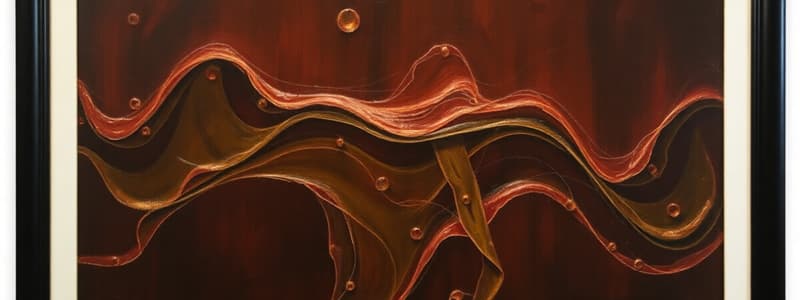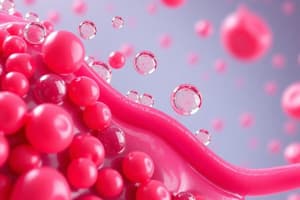Podcast
Questions and Answers
What initiates the digestion of lipids in the mouth?
What initiates the digestion of lipids in the mouth?
What role does bile play in lipid digestion?
What role does bile play in lipid digestion?
What percentage of triglycerides are converted to diglycerides and fatty acids in the stomach within two to four hours after eating?
What percentage of triglycerides are converted to diglycerides and fatty acids in the stomach within two to four hours after eating?
Which enzyme primarily breaks down triglycerides in the small intestine?
Which enzyme primarily breaks down triglycerides in the small intestine?
Signup and view all the answers
What is the main reason little fat digestion occurs in the stomach?
What is the main reason little fat digestion occurs in the stomach?
Signup and view all the answers
What is the primary role of micelles in the digestive process?
What is the primary role of micelles in the digestive process?
Signup and view all the answers
What primarily composes the inner core of lipoproteins?
What primarily composes the inner core of lipoproteins?
Signup and view all the answers
Which component is responsible for processing triglycerides in the bloodstream?
Which component is responsible for processing triglycerides in the bloodstream?
Signup and view all the answers
How does high dietary fiber content affect cholesterol absorption?
How does high dietary fiber content affect cholesterol absorption?
Signup and view all the answers
What physiological condition is signified by the presence of excess fat in the stool?
What physiological condition is signified by the presence of excess fat in the stool?
Signup and view all the answers
What happens to triglycerides when they enter adipose cells?
What happens to triglycerides when they enter adipose cells?
Signup and view all the answers
What characterizes the difference between LDL and HDL lipoproteins?
What characterizes the difference between LDL and HDL lipoproteins?
Signup and view all the answers
What is the main function of chylomicrons in the body?
What is the main function of chylomicrons in the body?
Signup and view all the answers
What happens to chylomicrons after they have been circulating for about ten hours?
What happens to chylomicrons after they have been circulating for about ten hours?
Signup and view all the answers
How are triglycerides delivered to muscle cells for energy use?
How are triglycerides delivered to muscle cells for energy use?
Signup and view all the answers
Study Notes
Lipid Digestion
- Lipids are broken down into smaller components for absorption.
- Digestion begins in the mouth with lingual lipase and emulsifiers.
- Stomach's gastric lipase breaks down triglycerides into diglycerides and fatty acids.
- Bile acts as an emulsifier in the small intestine, increasing lipid surface area for enzyme access.
- Pancreatic lipase breaks down fats into free fatty acids and monoglycerides.
- Bile salts form micelles, which transport fatty acids and monoglycerides to the intestinal lining.
Lipid Absorption
- Monoglycerides and fatty acids reassemble into triglycerides within intestinal cells.
- Triglycerides, cholesterol and phospholipids form lipoproteins with protein carriers.
- Chylomicrons transport dietary fats via the lymphatic system and bloodstream.
- Cholesterol absorption is aided by dietary fats and hindered by fiber.
- Fat malabsorption can lead to steatorrhea, characterized by high fat content in stool.
Fat Storage and Utilization
- The body stores excess carbohydrates as glycogen and triglycerides.
- Chylomicrons transport triglycerides to adipose tissue for storage.
- Lipoprotein lipase breaks down triglycerides in chylomicrons, allowing fatty acids and glycerol to enter adipose cells.
- Muscle cells can also take up fatty acids for energy production.
- When energy needs exceed available fuel, stored triglycerides are broken down and released into the bloodstream.
Lipoprotein Types and Function
- Lipoproteins are classified based on size, density, and composition.
- VLDLs transport triglycerides from the liver to tissues.
- IDLs transport various fats and cholesterol.
- LDLs ("bad cholesterol") carry cholesterol from the liver to tissues.
- HDLs ("good cholesterol") carry cholesterol from the bloodstream to the liver.
Blood Cholesterol Management
- Healthy total blood cholesterol is under 200 mg/dL.
- Low LDL and high HDL levels are desirable.
- Omega-3 fatty acids promote lower total cholesterol and lower triglycerides.
- Saturated and trans fats increase LDL cholesterol and decrease HDL levels.
Studying That Suits You
Use AI to generate personalized quizzes and flashcards to suit your learning preferences.
Description
Test your knowledge on lipid digestion, absorption, and transport within the human body. This quiz covers key processes such as the breakdown of lipids, the role of bile, and the formation of lipoproteins. Understand the importance of dietary fats and their impact on absorption and storage.




